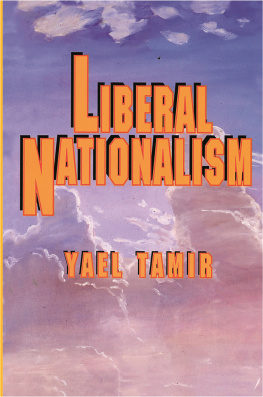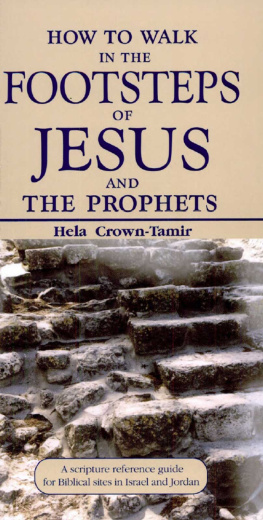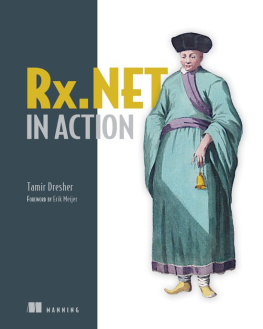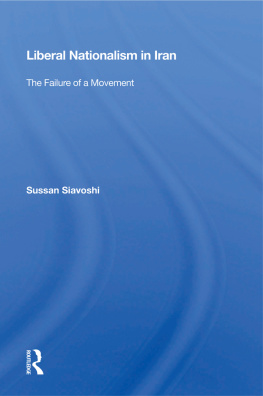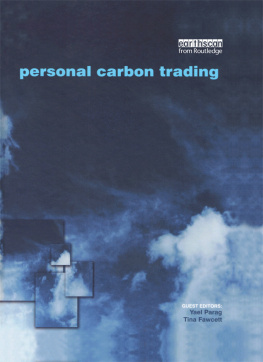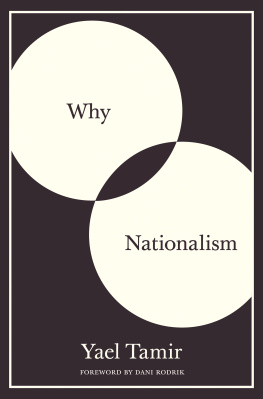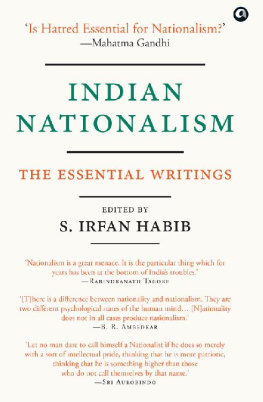Tamir Yael - Liberal Nationalism
Here you can read online Tamir Yael - Liberal Nationalism full text of the book (entire story) in english for free. Download pdf and epub, get meaning, cover and reviews about this ebook. year: 2022, publisher: Princeton UP, genre: Politics. Description of the work, (preface) as well as reviews are available. Best literature library LitArk.com created for fans of good reading and offers a wide selection of genres:
Romance novel
Science fiction
Adventure
Detective
Science
History
Home and family
Prose
Art
Politics
Computer
Non-fiction
Religion
Business
Children
Humor
Choose a favorite category and find really read worthwhile books. Enjoy immersion in the world of imagination, feel the emotions of the characters or learn something new for yourself, make an fascinating discovery.
- Book:Liberal Nationalism
- Author:
- Publisher:Princeton UP
- Genre:
- Year:2022
- Rating:3 / 5
- Favourites:Add to favourites
- Your mark:
- 60
- 1
- 2
- 3
- 4
- 5
Liberal Nationalism: summary, description and annotation
We offer to read an annotation, description, summary or preface (depends on what the author of the book "Liberal Nationalism" wrote himself). If you haven't found the necessary information about the book — write in the comments, we will try to find it.
Liberal Nationalism — read online for free the complete book (whole text) full work
Below is the text of the book, divided by pages. System saving the place of the last page read, allows you to conveniently read the book "Liberal Nationalism" online for free, without having to search again every time where you left off. Put a bookmark, and you can go to the page where you finished reading at any time.
Font size:
Interval:
Bookmark:

studies in moral, political,and legal philosophy
General Editor: Marshall Cohen
Yael Tamir
princeton university pressprinceton, new jersey
Copyright 1993 by Princeton University PressPublished by Princeton University Press, 41 William Street,Princeton, New Jersey 08540In the United Kingdom: Princeton University Press,Chichester, West Sussex
All Rights Reserved
Library of Congress Cataloging-in-Publication Data
Tamir, Yael.Liberal nationalism / Yael Tamir.p. cm. (Studies in moral, political, and legal philosophy)Includes bibliographical references and index.ISBN 0-691-07893-9 (cloth)1. Nationalism. 2. Liberalism. I. Title. II. Series.JC311.T295 1993320.54dc2092-40490
This book has been composed in Adobe Palatino
Princeton University Press books are printed on acid-free paperand meet the guidelines for permanence and durabilityof the Committee on Production Guidelines for Book Longevity ofthe Council on Library Resources
Printed in the United States of America
1 3 5 7 9 10 8 6 4 2
eISBN: 978-1-400-82084-9R0
To my parents
A da and Y ehuda T amir
who educated me to believe thatto be a Zionist means to respect individuals,their rights, and their national aspirations,and to my daughters
C armel and T al
who I hope will choose to respectthe same values.
My interest in liberal nationalism arose out of a process of self-reflection. Between 1977 and 1982 I was very active in the Israeli peace movement (Peace Now) and in the civil rights movement. In the course of these activities I was frequently required to justify the complex position held by supporters of the peace movement, and to vindicate its moderate version of national commitments as a legitimate Zionist approach. My attempts to explain these views made me aware of the vulnerability of the liberal nationalist position, forced to contend with the censure of both liberals and nationalists.
This book is the fruit of many years of personal political involvement, which eventually led me to a concern with the theoretical dimensions of liberal nationalism. I am grateful for the opportunity to spend three years doing graduate work on this subject at Balliol College, Oxford, and I am deeply indebted to the college for their support and for awarding me the Domus Scholarship.
When I embarked on this project, nationalism seemed almost an anachronistic topic. During my years in Oxford I exhausted a stockpile of phrases in answer to the comment, How interesting! (Oxfordese for How weird!)usually uttered after I reported I was writing a thesis on nationalism. In the years since, the situation has changed so radically that it is almost impossible to try and make sense of the political reality without giving thought to the pursuit of national ideals, and it now goes without saying that nationalism merits scholarly concern. The mostly aggressive character of the recent nationalist revival, however, placed me once again on the defensive, and I am now busy drawing up a new list of replies to How interesting!apparently evoked by the term liberal nationalism. In this book I try to show that, although it might be seen as an impossible match, liberal nationalism is a far more pervasive view than is usually assumed.
When writing the doctoral dissertation from which this book later developed, tutors and friends were generous with their guidance and advice. Sir Isaiah Berlin devoted a great deal of time to discuss with me the thesis developed in this book. His comments and criticism were invaluable, and I am grateful for the skillful and humorous way in which he led me to see my argument more clearly, and to accept that many questions would remain unanswered. After reading the final version of this book I have come to realise how deeply I have been influenced by his work and his temper as a philosopher. Alan Montefiore has closely followed my work over these years, and I have found his guidance and unlimited patience enormously helpful in confronting the philosophical complexities of the questions surrounding this work. His personal friendship and attention were very helpful in some of the hard periods I went through during these years. My tutorials with Steven Lukes introduced me to a whole range of questions in sociology and political science that I might otherwise have left unattended. I deeply appreciate his generous invitation to the European University in Florence and his willingness to read the final draft of my dissertation after he had left Oxford.
Charles Taylor and David Heyd kindly read parts of the work, and I am thankful for their very helpful comments. I would also like to thank Michael Freeden and Neil MacCormick for their stimulating suggestions. Michael Walzer and Amy Gutmann were very generous with their time and advice, read extensive versions of various drafts, and significantly contributed to my thinking on several thorny questions.
Being a graduate student at Balliol College meant that I was privileged to be part of a very stimulating and active group of political philosophy students. It is hard to overstate the contribution of this group to my work and to my intellectual development during those years. In particular, I would like to thank Valerie Monchi, Ragib Bhargaba, Seth Moglen, David Knott, and Mahesh Rangarjan, who read and commented on various drafts. I owe very special thanks to Michael Sarbanes, whose advice was always helpful, and who cheered me up at some of the most difficult moments. Following my return to Israel and in the course of working on this book, I benefited greatly from the remarks of Ruth Weintraub and Amnon Levav. This was a sceptical and critical audience, and although I tried to meet all their objections I am not at all sure I have managed to do so.
I wish to thank Ann Himmelberger Wald, philosophy and political theory editor at Princeton University Press, for her patience and her meticulous reading of the manuscript. Her comments were extremely helpful and are reflected in the final version.
I am very grateful to my editor Batya Stein for her comments, advice, and editorial skills. We have shared questions and doubts and the partnership between us has made this book what it is.
It is customary to end acknowledgments by thanking ones family, and with good reason. Sharing ones life with someone engaged in writing a book is not, to put it mildly, a pleasant experience. Lonny, Carmel, and Tal patiently endured the closed door of my study and gave me the love and support without which this book could not have been written.
There is no route back from reflectiveness. This phenomenon of self-consciousness, together with the institutions and processes that support it, constitute one reason why past forms of life are not a real option for the present, and why attempts to go back often produce results that are ludicrous on a small scale and hideous on a large one.
Bernard Williams
As we entered the final quarter of the twentieth century, there was a widespread assumption that the age of nationalism was over, that we were on the threshold of a postnational era. It is now clear that this assumption was wrong. National movements are regaining popularity, and nations that had once assimilated and vanished have now reappeared. Estonians, Latvians, Corsicans, and Lombards awake from the long slumber that communist regimes or Western European nation-states had forced upon them, flex their muscles, and set out to march under the banner of national independence. These attempts to turn back the historical clock are often marked by bloodshed and by a violation of the rights of neighbouring nations. In their enthusiasm to regain their national identity and acquire recognition and self-respect, national activists often overlook the changes that have taken place in the surrounding political, economic, and strategic circumstances, and fail to realise that national slogans have become obsolete. The era of homogeneous and viable nation-states is over (or rather, the era of the illusion that homogeneous and viable nation-states are possible is over, since such states never existed), and the national vision must be redefined.
Font size:
Interval:
Bookmark:
Similar books «Liberal Nationalism»
Look at similar books to Liberal Nationalism. We have selected literature similar in name and meaning in the hope of providing readers with more options to find new, interesting, not yet read works.
Discussion, reviews of the book Liberal Nationalism and just readers' own opinions. Leave your comments, write what you think about the work, its meaning or the main characters. Specify what exactly you liked and what you didn't like, and why you think so.

